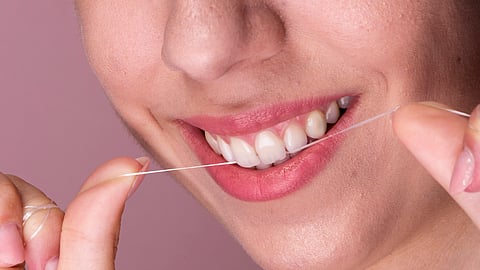

You vigorously brush your teeth twice a day and meticulously rinse your mouth like there’s no tomorrow. For all practical purposes, you know how to keep your teeth happy. But did you know—that all this is not enough? Cavities can still besiege your teeth, plaque can still erode your enamel, and gingivitis can still wreak havoc in your poor gums. Dentists say: Floss, floss, floss!
What is flossing?
Simply put, flossing is the process of cleaning your teeth using a thin, long thread called dental floss. “As we all know, there are 32 teeth. These contribute 20% of the total tooth surface. But when we brush, we cannot reach what is called the interdental area. That’s when flossing comes in handy, helping remove stubborn food particles and plaque from your gum line that brushing can’t quite reach,” says Dr Abrar Ahmed, root canal specialist and founder-CEO of Project Smiles Dental in Banjara Hills.
Why is flossing necessary?
Flossing freshens breath, removes plaque, reduces cavities, and prevents gingivitis (early stage of gum disease) and periodontitis (later stage of gum disease), apart from having a slew of other health benefits.
“When we floss, the thread slides between two teeth, which stimulates the gum area. The blood circulation of the gum area improves and this ensures proper health of the tissue,” explains Dr Abrar, adding that gingivitis has serious health implications which go beyond dental health. He underscores, “Gingivitis can lead to diabetes and respiratory illnesses in the long run. So making flossing a part of your dental care routine is the need of the hour.”
Flossing is key, considering that studies show that 46.6% Indians suffer from gingivitis. “It is scary and unpleasant to feel my gums bleed every time I brush my teeth. My gums swell up and it is very worrisome,” says Sneha, a 19-year-old college student.
How to floss correctly?
There are an array of methods to floss but it is best to consult your local dentist to find which technique works best for you. “Flossing is a low-risk and low-cost way to improve your dental hygiene. But there are quite a few flossing products in the market and it is best to use a waxed dental floss,” advises Dr Abrar, adding that traditional methods are not very effective. “Cleaning your teeth with mango leaves, twigs, and herbs is actually quite harmful for your teeth. It’s simple: These were not made for your teeth and oral health because they are very harsh,” he informs.
A good habit
Experts recommend flossing at least once a day, either in the morning or right before sleeping. However, many Indians are yet to jump onto the flossing bandwagon. Dr Abrar says lack of awareness is one of the major causes. “In western countries, flossing is introduced early on but here we take it for granted. It doesn’t help that we gobble up biryani, haleem and all sorts of sugary items. We are always in a rush and don’t like to spend those extra two or three minutes flossing. Start flossing, everyone!”
So, dear Hyderabadis, it’s simple. Want good teeth and top-notch dental health? Flossing is the way to go.